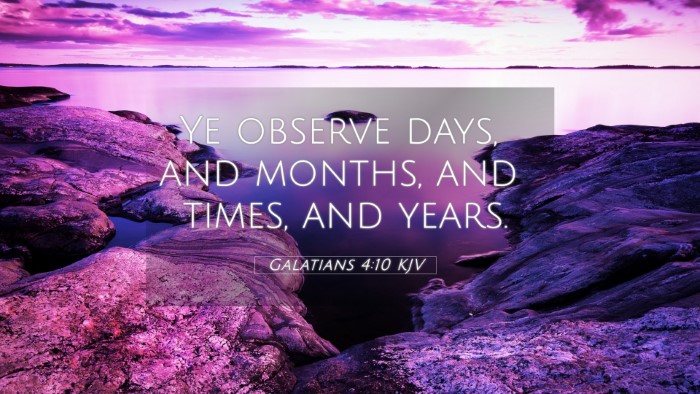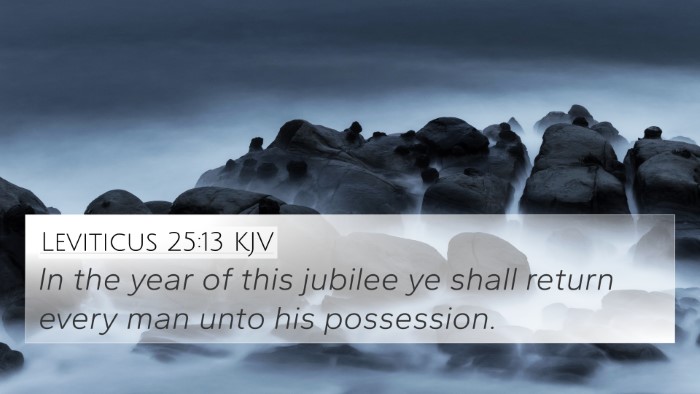Understanding Galatians 4:10
Galatians 4:10 states, "Ye observe days, and months, and times, and years." This verse is part of Paul's exhortation to the Galatians concerning their tendency to revert to Jewish legalism following their acceptance of the gospel. Below, we summarize interpretations from several public domain commentaries, providing insights for better understanding.
Commentary Insights
Matthew Henry's Commentary
Matthew Henry emphasizes that the Galatians, by returning to the observance of special days and seasons, were falling back into the bondage of the law. He highlights how this practice distracts believers from the core tenet of Christianity: faith in Christ rather than adherence to the law for righteousness. Henry points out that such observances can lead believers away from the grace afforded by the new covenant.
Albert Barnes' Notes on the Bible
Albert Barnes notes that the Galatians were indulging in a system of days, months, and years typified by festivals and rituals celebrated under the Mosaic law. He contextualizes this by explaining how it can signify either a return to the Jewish economy or an incomplete understanding of the grace offered through Christ. Barnes underscores that Paul’s intent is to assert that such observances are not necessary for salvation and serve only as a reminder of the bondage prior to Christ.
Adam Clarke’s Commentary
Adam Clarke elaborates on the dangers of mixing the observances of the law with the freedom found in faith. He discusses cultural and historical aspects that the Galatians may have found compelling. Clarke cautions that these practices may lead to spiritual decadence, advocating instead for a life led by the Spirit as a contrast to a life bound by legalistic observance.
Cross-Referencing Bible Verses
In studying Galatians 4:10, several cross-references help illuminate its meaning and connection to other Biblical texts:
- Galatians 5:1 - "Stand fast therefore in the liberty wherewith Christ hath made us free..." This verse reinforces the theme of freedom from the law.
- Colossians 2:16-17 - "Let no man therefore judge you in meat, or in drink, or in respect of an holyday, or of the new moon, or of the sabbath days..." A direct connection to the observation of rituals and their insignificance in the light of Christ.
- Romans 14:5 - "One man esteemeth one day above another: another esteemeth every day alike..." Paul again addresses the varying views on special days and calls for mutual respect among believers.
- Galatians 3:24-25 - "Wherefore the law was our schoolmaster to bring us unto Christ..." This passage signifies the purpose of the law and the transition to faith in Christ.
- Hebrews 8:13 - "In that he saith, A new covenant, he hath made the first old..." Welcoming the new covenant established by Jesus, rendering the old covenant obsolete.
- 1 Corinthians 10:33 - "Even as I please all men in all things, not seeking mine own profit..." Highlights the importance of spiritual conduct over ritualistic observance.
- Acts 15:10-11 - "Now therefore why tempt ye God, to put a yoke upon the neck of the disciples..." This illustrates the early church's decision to avoid placing burdens of the law on Gentile believers.
Conclusion
In summary, Galatians 4:10 serves as a critical reminder to Christians about the dangers of returning to a law-based system of observance. As discussed through the insights of Matthew Henry, Albert Barnes, and Adam Clarke, this verse emphasizes the transition from law to grace through faith in Christ. The cross-references provided help in understanding the broader scriptural context, showcasing how different Bible verses relate to this theme of freedom against the backdrop of legalism.
Keywords and Their Importance
This analysis has surfaced several primary keywords essential for understanding the connections between Bible verses, including:
- Bible verse cross-references
- Connections between Bible verses
- Cross-referencing Biblical texts
- Thematic Bible verse connections
Additionally, secondary keywords such as tools for Bible cross-referencing and Bible concordance enrich the study process. For those seeking to deepen their understanding, utilizing a Bible cross-reference guide can enhance their study experience.








